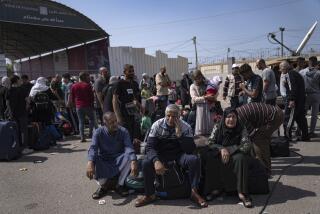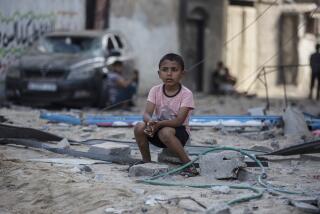Syria refugees find sanctuary in Libya
Even as it recovers from its recent civil war, Libya is fast becoming a place of sanctuary for thousands of refugees fleeing the bloodshed in Syria.
Buses from Damascus, crammed with Syrian families, are arriving daily in the eastern city of Benghazi, the cradle of the effort to oust the late Libyan leader Moammar Kadafi.
“Up to 4,000 Syrian families have sought refuge in Libya in the last weeks, and the numbers are increasing every day,” said Mohammed Jammal, a Syrian community leader in the city. “The buses arrive full and go back empty. There used to be two a week, but now there are two a day.”
Crammed full with families and young men, the buses pull into the station at all times of the night after a grueling 41/2-day trip, crossing first into Jordan, then across the Suez Canal, through Egypt and down the long road to Benghazi.
They arrive in a city where uncollected trash still lines the streets, schools have only recently reopened, and residents are just beginning to find work. Slogans of the Libyan revolution share space on walls with posters of loved ones lost in the fighting. Radio advertisements are interspersed with warnings to civilians not to touch unexploded ordnance, including grenades, half-shattered rockets and tank shells that still lie scattered around the city.
A country that is only now beginning to pick itself up may seem an unlikely destination for families fleeing violence in their own nation. But some of the Syrian families pouring into Benghazi say that, in many ways, Libya is one of the only countries in which they could feel safe.
“Libya is free now. There is no secret police to watch you move,” said a refugee who, like others interviewed, was too fearful to give his name. “They had their revolution, and now they will help us have ours.”
The nascent Libyan government, which in October was the first to formally recognize the Syrian National Council, the country’s most prominent opposition bloc, has said it will take in the refugees.
Many of the families escaping Syria are opponents of the government of President Bashar Assad. They fear they could be arrested in Lebanon, where the governing coalition is friendly to the Syrian regime, or in Turkey or Jordan by Syrian intelligence officials who have infiltrated those countries.
Rows of mobile homes are being readied for them in a camp that already houses 120,000 people displaced by the Libyan war.
The camp opened during the early days of that conflict as a collection of quickly erected tents to house thousands of migrants as they waited to flee the country. They included many Africans who became vulnerable to attack when rumors spread that Kadafi was hiring African mercenaries. Those from countries so insecure it is dangerous for them to return home remained in the camp as it grew into a large sprawl of mobile homes surrounded by a high wall. They have been joined by Libyans affected by the rancor generated during the war.
“We have 35 Syrian families being sent here,” said Ibrahim Asfour, who manages the camp for the Libyan Red Crescent Society. “And we expect many more.”
But many families are too afraid to register for help from aid organizations.
Jammal, the Syrian community leader, said he used money donated by Libyan sympathizers and Syrians living in the country to rent apartments to house some of them. But as the numbers increase, that is becoming increasingly difficult.
“In the last 10 days, we have had problems finding housing,” Jammal said.
Most of the families come from the strife-torn western city of Homs and other restive parts of Syria. One man, who said he had arrived in Benghazi four days earlier, described his family’s harrowing ordeal.
He and his wife, four daughters and 2-year-old son had lived on a street that is a fault line between neighborhoods dominated by Sunni Muslims and members of the Alawite sect, a Shiite offshoot. For three months, he said, they had watched the tensions grow and violence unfold.
Assad’s regime is dominated by Alawites, and Sunni Muslims have been a driving force in the uprising against him.
“The situation is very bad in Homs between Sunni and Alawite sectarian groups,” the displaced man said. “They are all fighting now.... The security forces encourage this.”
The city has been a focal point of antigovernment protests and also shelters army defectors, who regularly clash with the security forces. The Syrian man said the government had stationed six tanks on his street.
“It is war,” he said. “Sometimes we could not go outside for days because of the fighting. I would wait until there was a lull to go out for supplies, or until the fighting in the next neighborhood was so bad that it diverted attention away from my street.”
When the man’s uncle was killed in a mortar blast as he was out buying bread, the family decided it had to leave.
“We waited more than a month to get the passports and had to pay bribes at the immigration office,” he said. “Nearly everyone I spoke to in Homs is talking about getting out.”
The man said he was a painter and hoped to find work in Libya. “We left our home, our car, everything,” he added, his voice cracking, tears in his eyes.
Before the Libyan civil war, thousands of Syrians worked in the country. The Libyan Red Crescent Society estimates they numbered about 12,000 when the war began.
“Many left, but now they are returning and bringing their families with them,” said Ziad Dresi, a refugee coordinator for the Libyan Red Crescent Society.
Many refugees said they planned to stay with relatives or acquaintances.
“I worked in Libya 20 years ago,” said a man from Homs, who was unloading a few possessions from a bus that had just arrived. “Many of the people I knew from then have died of old age or were killed in the Libyan war, but I still have some friends.”
Sherlock is a special correspondent.
More to Read
Start your day right
Sign up for Essential California for news, features and recommendations from the L.A. Times and beyond in your inbox six days a week.
You may occasionally receive promotional content from the Los Angeles Times.





